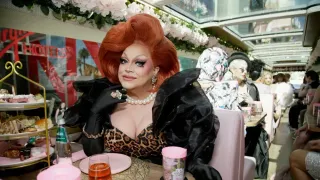September 14, 2020
2020 Toronto Int. Film Fest Diary: Entry 1 - Adapting to a New Normal
C.J. Prince READ TIME: 5 MIN.
There isn't an easy way to kick off coverage for a film festival this year given the state of the world in 2020. The COVID-19 pandemic makes it impossible to throw a proper festival, with cinemas going from a place of comfort to a potential death trap of recycled air and poor ventilation. At the same time, everything getting swallowed up by the political landscape in an election year only highlights the irrelevance of gatherings like a film festival; in a year where the term "existential threat" gets thrown around a lot checking out the next potential Oscar hopeful doesn't feel high on the priority list.
And yet the Toronto International Film Festival soldiers on, likely because it doesn't really have a choice (the festival doubles as a massive fundraising effort for their year-round operations, so organizers can't just call the whole thing off). The pandemic has done a lot to remind us of the power of the bottom line in the arts and TIFF is no exception. After spending years establishing themselves as the starting point for awards season with enough star power to attract people from around the world, they're now flying blind in their attempt to pivot back on their platitudes about loving cinema. It's a difficult thing to do in a year where they make headlines for laying off 31 employees, shutting out some established press for seemingly arbitrary reasons and reversing their policy on wearing masks after a major backlash, among other not so flattering news items. Here's hoping that, when TIFF starts licking its wounds after this year's festival, they'll spend a little time reflecting on what exactly this whole celebration is for.
So, it makes perfect sense for TIFF to pick "David Byrne's American Utopia" as this year's opening film, due to its broadly appealing and self-satisfied nature. Spike Lee directs this filmed version of Byrne's successful 2019 Broadway show, where the Talking Heads singer performs a collection of his songs with a mobile band on a sparse, grey stage. Byrne is a musical genius who helped make the greatest concert film of all-time with "Stop Making Sense," so it's nice to see that he can still put on a great show. It also helps that most of the setlist relies on some of the Talking Heads' best work (highlights include infectious versions of "I Zimbra" and "Slippery People" that are impossible to listen to without moving) but even the newer songs get reworked and incorporated into the show to keep the energy high.
Lee does a solid job behind the camera; his direction working to translate the show from stage to screen to the point where it feels mostly invisible (with one big exception that's best left unspoiled). The biggest snag here is Byrne's attempt at stringing everything into some sort of cohesive whole, which appears in the form of political gestures or commentary between songs that are largely empty, serving no purpose other than validating the opinions of the already converted. Luckily, the more cringe-inducing injections of political commentary don't make too much of a dent in the proceedings given that Byrne has a deadly back catalogue. With music like this, it's easy to ignore the noise.
In "The Disciple" director Chaitanya Tamhane delves into the world of khayal, a genre of Indian classical music, to examine the struggle of becoming a successful artist. The film starts with 22-year-old Sharad (Aditya Modak), an aspiring vocalist who does nothing but study and practice khayal in the hopes of becoming a success like his musical idols. Told over three decades, Tamhane slowly but surely shows Sharad realizing that all of his work might never pay off and that all of his devotion to the craft will never make him rise above mediocrity.
Tamhane opts for a slow, deliberate approach with Sharad's story, which can make "The Disciple" a tough sit with its 2 hour-plus runtime. But patience pays off big time here, as Tamhane builds a nuanced portrait of one man's dream suffering a death by a thousand cuts. It's a feeling felt throughout, right down to Tamhane's direction which almost always films everything at a remove (I can't remember if there was a single close-up shot in the entire film). The camera remains grounded, treating Sharad as just another face in the crowd; the assuredness his process of gradually accept his own irrelevance, and aligning with the film's portrayal of him, will be a tough act to follow for the other films at this festival.
Finally, a bit of a detour on my first day. For press and industry virtually attending, there's a somewhat secret collection of titles screening as well. With some time to kill after checking out what's in the official selection, I decided to watch Bruce LaBruce's "Saint-Narcisse," which just screened at Venice. The film's exclusion from TIFF's proper line-up is a bit confusing given LaBruce's status as a queer cinema icon in Canada, along with the fact that it's such an entertaining work of transgressive art. Taking place in the 1970s, "Saint-Narcisse" tells the complicated story of Dominic (Félix-Antoine Duval), a full-blown narcissist who's admired for his beauty by everyone around him. Dominic lives with his ailing grandmother and believes his parents died when he was a baby, only to find out his mother (Tania Kontoyanni) is still alive as an exile in the eponymous Quebecois village. But more surprises are in store, as Dominic discovers he has a twin brother living in the local monastery under the strict rule of a perverted priest (Andreas Apergis).
It's refreshing to see a film so specific in its vision yet unpretentious in its approach, leaning into its absurdity and staying dead serious in following through on its story. LaBruce also has a proper understanding of how to approach taboo subjects in filmmaking, with shock value coming from the film's casual acceptance of things like incest and religious desecration rather than relying on gratuitous imagery. The film has blasphemy built right into its DNA, and LaBruce offers no judgment towards his characters or their misbehaviors; you either accept the deranged world he's created or you don't. LaBruce's style (which could be dismissed as shoddy for those less inclined to give it a shot) may be a turnoff for some, but "Saint-Narcisse" scratches a certain transgressive itch of mine. I can't say I've seen much else in 2020 as imaginative or funny as this.






